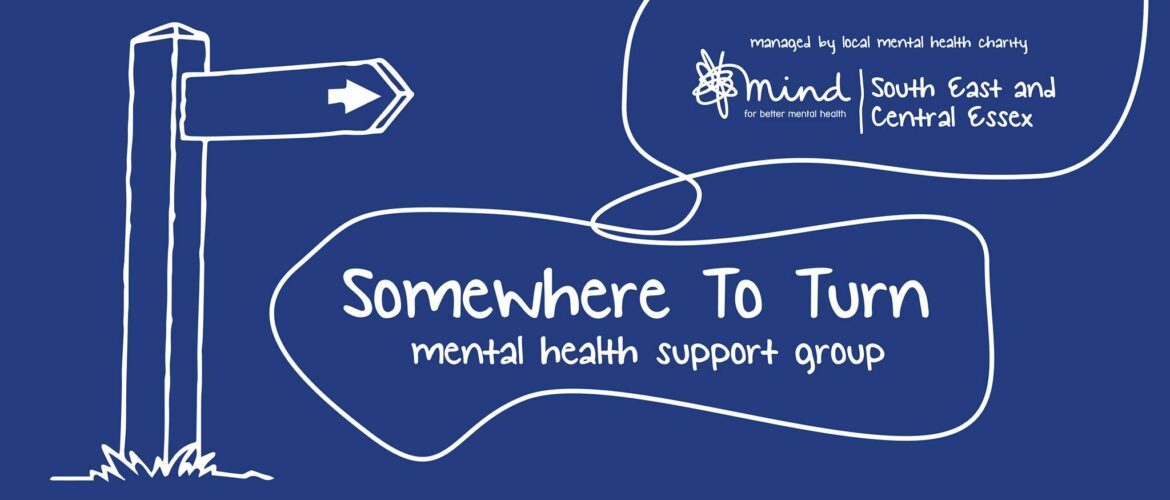The Somewhere to Turn service (S2T) is a new online peer support group for people with mental health challenges.
S2T is a project launched by South East and Central Essex Mind (SECE MIND), a mental health charity providing a range of services in the community for those with mental health difficulties. Whilst SECE MIND is affiliated to national Mind, it is a completely separate charity and as such, responsible for raising the funds needed to fulfil the services they offer. Although the Somewhere to Turn project covers only part of Essex, do read on if you are based elsewhere in the UK because there may be a similar project near you.
SECE MIND services include supported housing, counselling and support services to those living in Southend, Chelmsford, Castle Point and Rochford. More recently, the charity has developed Somewhere to Turn, as an enhancement to existing services, by providing mental health advice, information and support to those who need it through a new online peer support group.
Elysia is a volunteer on the Somewhere to Turn service. Here she explains her personal experience of the project, how it benefits people with mental health issues, their loved ones and carers, and a shout out for anyone who might also be interested in volunteering:
So I’ve been working with MIND for a couple of years now and started as a volunteer on the Somewhere to Turn service (S2T) which as the name suggests, provides support to those who aren’t sure where to go, what to do or what to talk to. The service initially was based in our Jubilee Centre in Southend which offered a space for people to phone, email or drop-in, if they needed information or advice relating to mental health, however now Somewhere to Turn operates virtually on Facebook.
A safe, non-judgmental support group
The S2T service helps navigate people through mental health by signposting people to suitable organisations both locally and nationally. Not only this but it gives people a space to speak and to be heard and really listened to – without fear of judgement.
Although mental health is becoming more understood, awareness is increasing and more conversations are being had around these various issues – there is unfortunately a stigma that is still present in some places. Some do not have support networks where they feel safe discussing what they are feeling or thinking and so feel misunderstood, isolated or confused. The S2T group is a form of support where people can feel safe to ask questions, have discussions and share their own experiences in relation to mental health and wellbeing.
The early days of Somewhere to Turn
In S2T’s earlier days, we would work with a wide range of service-users and found it was not just those who were struggling themselves with mental health but also people who wanted to know more and better understand for the sake of another who was struggling, perhaps a friend or family member. They wanted to know how they could help their best-friend or daughter or brother to cope. Often, people simply didn’t know the options available to them in getting treatment or further support for mental health.
One of the reasons why I think it was such a worthwhile service and still is today, is because of the number of people who used it. Not from a statistical or outcome-focused point of view, but because it demonstrated the need for such a service. People used it because they didn’t know where to turn…
Adapting to current circumstances
That’s why I think it’s really important we have been able to develop the service more recently so we can continue to provide support to those who may need it.
COVID19 has brought not just global rates of sickness, isolation and stress but a whole new way of life really.
We needed to adapt to the demands that have been placed on our society and find a way to still provide information, advice and support to the community, especially in the aftermath of the pandemic where we are now faced with ongoing pressures.
I think it’s fair to say absolutely everyone’s mental health has been affected by this situation in one-way shape or form so it’s only more pertinent that people feel they have somewhere they can go.
A virtual presence in terms of an online support group allows us to do this and each week we are receiving more requests from people wanting to join. Of recent, virtual peer support groups have become more widely used and while some may be hesitant about using them, I think due to concerns around replacing human contact and physical company with a virtual presence, this is not necessarily the case.

Fostering safety and trust
Many people use virtual support groups as a space for an initial introduction between people, to establish a community that fosters safety and trust which people can then integrate into their physical and everyday worlds with the possibility of meeting ‘in real life’ if they wish.
Somewhere to Turn is not necessarily meant as an alternative for more traditional support groups. However equally, as we do become more technologically competent, we find online virtual groups are more suited for some people and is actually preferred. We are not limited by office hours or location for those who previously may have found it difficult in their working day to find time to call or weren’t able to drop into the Jubilee Centre in Southend. Consequently, I think adapting the service to be delivered virtually has increased its accessibility and efficiency, allowing us a charity to become more cost-effective, which ultimately enables us to continue doing what we do.
Talking to people with similar lived experiences
Sometimes it’s not just the experts or professionals that can help, but actually communicating with someone else who has perhaps gone through what you have, or is currently feeling how you’re feeling – is equally helpful.
Those with lived experiences of mental health difficulties are able to provide wonderful and invaluable support, another benefit of S2T adapting to an online peer support group and which is why we want the group to be a place of shared peer support – from not only us at SECE Mind who help facilitate, but the members too.
Could you contribute?
We would like everyone who feels able to share and who wants to support others, to contribute. By sharing insights, tips or even just acknowledging that they’re there and understand what someone might be going through is all a part of helping someone feel like they’re not alone and that there is a supportive community that can help lessen the load and provide light at the end of the tunnel or some respite at the end of a difficult day.
In these times of social media where we’re all meant to feel connected and closer to one another. I think quite often, a lot of people feel more isolated, inadequate or perhaps left behind. That’s why I think it’s important to use social media and the supportive virtual communities that are arising as a result, for good.
Everyone is welcome
We recognise that mental health does not discriminate between who it chooses to affect and as we are all human and value and appreciate empathy and compassion, I think everyone can make use of the Somewhere to Turn group. Everyone is welcome – regardless of age, having a diagnosis or whatever – if you feel you would like to share or contribute or that you are not sure where else to turn, we invite you to join our group.
Could you volunteer?
We are currently looking for volunteers for our Somewhere to Turn online group. If you have experience supporting those living with mental health challenges and have a few hours a week to spare, we would love to hear from you. Please email us on office@seandcessexmind.org.uk.
**Please note: Those wanting to join are required to answer some brief questions before being accepted into the group and please be sure to accept all the group rules as otherwise, requests can not be accepted and you will not be able to join. The questions and rules are there to ensure S2T remains a safe, respectful environment for all who chose to use it.
Also, we would like to make clear that the S2T group is not a crisis service. Whilst the group is monitored by us at SECE Mind, there are not volunteers constantly available for the time being. There are volunteers available at select time periods on certain days, when they can answer questions/provide support on the group or privately (via message) if needed. Therefore if anyone feels as though they are in crisis, unsafe or that they are a risk to self or others -they will need to use the appropriate emergency services in place so contacting 999/111, attending A&E or calling Samaritans.

